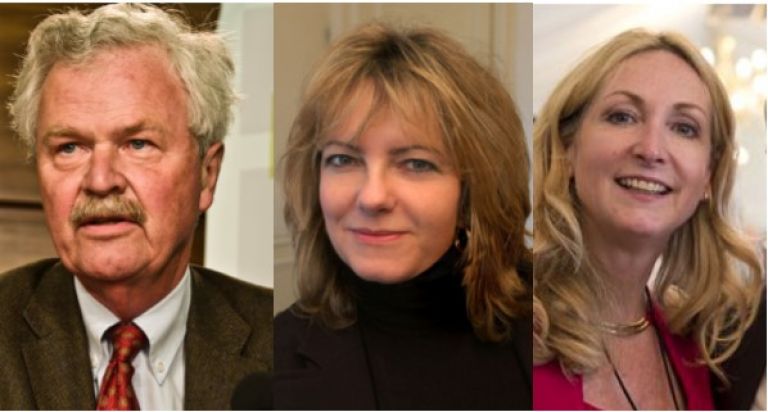Former SAA Presidents reflect on SAA's 5 years

Last year SAA celebrated its first 5 years. We interviewed Gerhard Pfennig, Janine Lorente and Barbara Hayes the former and current chairs of the board of directors as well as Executive Director, Cécile Despringre, to look back at the first 5 years and the future:
Cécile Despringre, as the Executive director from the launch of the organisation, what was it like getting SAA going? What was the reason behind it?
CD: Our founder members were so enthusiastic and supportive that we were able to establish the organisation quite quickly.
So much of the talk in the European institutions about copyright and collective management was from the perspective of the music industry. Our founding members saw a need to change that and point out the problems of screenwriters and directors who, generally speaking, are disconnected from any exploitation related royalties.
Other organisations obviously felt the same needs as we added a lot of members very quickly. We’ve gone from 9 founder members to 29 in 22 countries.
Gerhard Pfennig (Chair of the SAA board of Directors (2011-2012), Spokesperson for Initiative Urheberrecht), you took over from founding chair, Suzan Dormer, in 2011, as SAA established itself in Brussels. What do you remember from your time as chair of the SAA board of directors?
GP: Those were rough times; we had to establish SAA as a brand for an organization representing author's interest through collecting societies. We first tried to build up good relations with the author's organizations - FERA and FSE - and with EU representatives.
How do you think SAA has grown and what are the opportunities for the future?
GP: Today I am impressed with how the SAA has evolved. It is doing a great job and the board of directors are so engaged. The results justify the hard work.
Janine Lorente (Chair of the SAA board of Directors (2012-2015 for SACD), Deputy General Director, SGAE), you have been the longest standing chair of SAA so far. What do you think SAA has brought to the discussion at European level?
JL: When we launched SAA, we were all passionate about promoting the adoption of a right to remuneration for the benefit of writers and directors of audiovisual works. Even though this is a legitimate and fair right for authors, we envisaged our actions on a very long term. Even if our requests have not yet been put into a law, I am really pleased to see how well we have done in such a short time: this right of remuneration is now discussed and debated at political level thanks mainly to the tremendous job done by our team in Brussels.
Where do you see the conversation going next?
JL: The focus will be on online distribution. SAA needs to make sure writers, directors and all authors in general get their fair share of the immense revenues generated by internet’s global actors.
Last year SAA published the second edition of its white paper. Why was that?
CD: We published the 1st edition of our white paper in 2011 as part of bringing transparency to our sector and showing the challenges faced by Europe’s screenwriters and directors. The main thrust of our paper was to present a workable solution to guarantee screenwriters and directors remuneration for the online exploitation of their works: an unwaivable remuneration right with compulsory collective management.
There were two main reasons for updating the white paper last year. The first was that our sector is changing so quickly that the industry figures we had were no longer a reasonable basis for discussions about the sector. The number of VOD services had increased by over 400%! The second reason was that the political landscape had also changed. Not only was there a new European Commission and new MEPs, the issue of authors’ remuneration had come more to the fore in consultations and the speeches of various officials. We had also held discussions with partners in the sector and clarified our proposals. We were very pleased that the second edition was endorsed by FERA and FSE, demonstrating that this was a proposal that the whole screenwriters’ and directors’ community in Europe could support.
Barbara Hayes (Current Chair of the SAA board of Directors), you have taken over the chairmanship of SAA. Where do you see the main challenges and opportunities for the future?
BH: We are living in interesting times where 'what the consumer wants the consumer will get' appears to be the mantra of the day.
I see SAA as a strong voice working on behalf of its constituents in Europe, collaborating with other European organisations as appropriate to ensure a consistent and powerful message is achieved to relevant legislators within the Commission. But mostly I firmly believe our ultimate strength is in thorough and effective strategies for campaigning going forward to try and secure that (sometimes seemingly elusive) online remuneration right for audiovisual authors that remains our ultimate goal.
I am convinced that our role is as educators to those who influence legislation, ensuring they understand the consequences of potential changes being considered that will affect an audiovisual author’s ability to make a fair living from their work from across various platforms in the 21st Century.
The strength of the SAA is in the will of its members to actively work together to achieve this goal. The year ahead brings many challenges and potential threats to the current regime for many creators and we will continue to seek the best possible outcomes for audiovisual authors together.
None of this is new! It is exactly what previous Chairs of SAA have done so ably with the help and support of Cecile Despringre and her excellent team, as well as the membership of SAA. We are heading in the right direction and a steady but firm course needs to be held.
